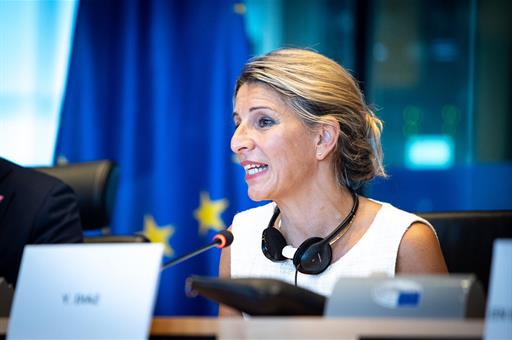Díaz pushes for ratification of ILO harassment convention and recovery of social dialogue agreements
News - 2023.9.7
Yolanda Díaz has advocated in Brussels, before the European Parliament, to extend the ratification of the International Labour Organisation's (ILO) Convention 190 on violence and harassment to the 27 countries that make up the EU, and to recover the agreements with social dialogue throughout the EU.
This was stated by the acting minister at the presentation of the Ministry of Work and Social Economy's programme during the Spanish presidency of the Council of the EU to the European Parliament's Committee on Employment and Social Affairs.
Social dialogue, decent work and social economy
Díaz explained the need to continue to deepen the democratic and social reconfiguration of the European project from the labour sphere, promoting social dialogue, decent work and the social economy, the three priorities the department she heads has set for the European presidency.
Decent work
In the field of decent work, the EU Council Decision to be adopted on 18 September will allow EU member states to ratify ILO Convention 190, something that Spain already did in 2022.
At the same time, progress will be sought on directives for work on digital platforms and for protection against lead and diisocyanates. The acting vice-president has called for focusing negotiating efforts on the correct classification of people working on digital platforms and on guaranteeing the right to algorithmic transparency, thereby being able to put an end to situations of abuse in the form of bogus self-employment, as evidenced, time and again, by courts across Europe. "The future of work in Europe is at stake in this directive," insisted Díaz, who met with the rapporteur for the directive on platform work, Elisabetta Gualmini MEP, before her appearance.
In line with decent work is the debate on the relationship between precarious work and mental health. "It is our duty to say loud and clear that the pandemic of stress and anxiety cannot be blamed on defective brains but must be linked to working conditions that are incompatible with life", explained the acting minister, who also announced that the Council will adopt conclusions on mental health and job insecurity during the meeting to be held at the end of September in Toledo.
Díaz recalled that in recent years she has actively taken part in pushing forward initiatives such as the directives on minimum wages, wage transparency and balanced presence on boards of directors.
"It is important for European and Spanish citizens to know that important things are being achieved. A decade ago, at the height of the austerity era, it seemed impossible to have a directive on decent minimum wages. Today there is a common legal framework that favours wage increases in a third of the member states and affects more than 25 million workers, especially women", explained the acting vice-president, who recalled that in Spain 18 major agreements have been reached with social dialogue, reaching consensus on positions with trade unions and employers. The challenge now, the minister insisted, "is to make social dialogue the hallmark of Europe".
Social dialogue
To make further progress in this direction, Díaz is confident that the European social partners' negotiations on telework and the right to disconnect can be concluded with what would be the first major European agreement resulting from social dialogue in more than 13 years.
Democracy at work and green collective bargaining will be discussed to make progress in this area. "European workers have the right to take part in the decisions that affect their daily lives. Not only that, but we also know that when workers' participation rights are extended, productivity, innovation and work organisation also improve," insisted Díaz.
The involvement of the social partners in the much-needed green transformation is also being sought, and the EPSCO Council is expected to adopt conclusions on democracy at work and green collective bargaining at the high-level meeting in Santiago de Compostela on 21-22 September.
Social Economy
The production model proposed by the social economy, the third priority of the presidency, combines social and climate justice. This different way of generating employment and economic activity already has the support of than 42,000 companies in Spain and accounts for around 10% of GDP.
To further develop this economic model and to be able to take advantage of its full potential, Díaz will promote the first Council Recommendation on the framework conditions for the development of the social economy to consolidate a sector that currently generates more than two million jobs in Spain alone.
For the acting Minister for Work, encouraging this way of understanding economic management means following the path that was glimpsed in the solidarity-based management of the pandemic. "The future of the EU depends on Europe being able to protect people," said Díaz.
"We are part of a Europe that wants to move forward and our presidency's main message is that it is in times of uncertainty that it makes the most sense to go for what we know works", concluded the Vice-President-in-Office, who began her speech by meeting with the Chairman of the European Parliament's Employment and Social Policies Committee, Dragoș Pîslaru, and ended the day with a meeting with the Chair of the Greens' group in the European Parliament, Terry Reintke.
Non official translation
More Info
- Website of the Spanish Presidency of the Council of the European Union
- Alegría underlines the crucial role of education in successfully tackling the challenges facing the European Union (2023/09/07)
- The Spanish Presidency of the EU is committed to promoting the consideration of Culture as an Essential Public Good and a Global Public Good (2023/09/07)
- Social investment, coordination of social security systems and improvements for the self-employed and minimum incomes, priorities of the Spanish presidency (2023/09/07)
- Subirats presents the priorities of the Spanish presidency in Brussels in the field of higher education (2023/09/07)





